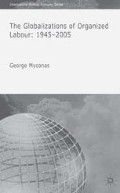Abstract
At the commencement of this book emphasis was placed on the need to give meaning to ‘globalization’ as it relates to agency and, specifically, on the agency of organized labour. We have set about this task by gauging the extent to which labour has integrated across national borders, as well as the extent to which it has become estranged from the state. We have been able to carefully dissect the political community that organized labour constitutes, and to explore the complex interplay of relationships — internal and external — and characteristics that bind this sprawling transnational network. We have also been able to isolate structural imperatives and note the ways in which they have impacted on labour over time.
Access this chapter
Tax calculation will be finalised at checkout
Purchases are for personal use only
Preview
Unable to display preview. Download preview PDF.
Notes
ICFTU, ‘Trade unions, NGOs and tripartism: Decisions adopted by the Seventeenth World Congress of the ICFTU’ (paper presented at the Seventeenth World Congress of the ICFTU, Durban, 3–7 April 2000), p. 2.
World Confederation of Labour (WCL), ‘World Confederation of Labour: Activities Report 1998–2001’, (Brussels, 2001), p. 19.
Peter Waterman, ‘Social movement unionism: a new model for a new world order’, Review 16 (1993).
Philip Hirschsohn, ‘From grassroots democracy to national mobilization: COSATU as a model of social movement unionism’, Economic and Industrial Democracy 19 (1998): 655.
Patricia Ranald, ‘Korean unions resisting the International Monetary Fund’, in Protest and Globalisation, edited by James Goodman (Sydney, 2002).
Helen Trinca and Anne Davies, Waterfront: The Battle That Changed Australia (Milsons Point, 2000), pp. 211–23,
John Wiseman, ‘Trade union solidarity: the Australian waterfront, 1998’, in Protest and Globalisation, edited by James Goodman (Sydney, 2002), p. 180.
See also Arne Melchior, ‘A global race for free trade agreements’, (Oslo, 2003).
Barry Carr, ‘Globalisation from below: labour internationalism under NAFTA’, International Social Science Journal 159 (1999): 53–4.
Copyright information
© 2005 George Myconos
About this chapter
Cite this chapter
Myconos, G. (2005). Conclusion: The Past and Future Globalizations of Organized Labour. In: The Globalizations of Organized Labour. International Political Economy Series. Palgrave Macmillan, London. https://doi.org/10.1057/9780230512276_8
Download citation
DOI: https://doi.org/10.1057/9780230512276_8
Publisher Name: Palgrave Macmillan, London
Print ISBN: 978-1-349-54399-1
Online ISBN: 978-0-230-51227-6
eBook Packages: Palgrave Political & Intern. Studies CollectionPolitical Science and International Studies (R0)

